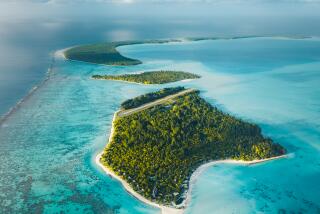Watching Life Slip From Pacific Standard to Fiji Time
- Share via
LAUTOKA, Fiji — Andrea and I decided to start our trip around the world with a vacation.
The endless preparations for our yearlong tour had sapped us. We were not ready to face the rigors of shoestring travel--incomprehensible tongues, mystery meals, the sweaty press of humanity. We would eventually rally, but first we needed a place where heavy lifting amounted to a cold drink and a back issue of the New Yorker.
Fiji beckoned. The 800-island South Pacific nation offered pristine beaches, a pleasant climate and warm, English-speaking people. A first stop here would allow us to wade into the shallow end of the world journey pool.
But we nearly did not make it. Three hours before we were to leave home in San Diego, we had yet to pack. The mountain of clothing and gear piled atop our dining room table mocked our modest backpacks. At the last instant, we panicked and pulled out two more bags, haphazardly stuffing them until they threatened to burst. (Yes, Andrea’s inflatable hanger made the cut.) We told ourselves we would shed the excess luggage in New Zealand, India or wherever our arms fall off from the weight of stupidity.
Our frenzied packing agitated the pets, who will stay with the man renting our house. Aretha, the cat, fled into the laundry room, refusing to come out and say goodbye. Maya, the dog, ran circles around our legs, barking in the direction of her leash. The farewell was made all the more sad by the sight of my golf clubs, already looking neglected and forlorn in a corner of my office.
A construction crew was tearing up the street in front of our house, replacing the water main, and we had been unable to use our driveway for days. We begged the foreman to let us park long enough to load our luggage, and he gave us five minutes. Andrea maneuvered our Explorer between a bulldozer and a steamroller, I flung our bags in the back and we sped off. Four months of planning came down to this messy getaway, closer to an evacuation than a departure.
Andrea’s mother--she’s storing our car--and grandmother dropped us off at the airport. We flew all night, lost a day to the International Date Line and landed in Nadi (pronounced nondy), on Fiji’s main island of Viti Levu. We grabbed a cab out of this tourist center and rode 12 miles north to Lautoka, the jumping-off point for the Yasawa Islands, where we would later travel by boat. The lush mountains and fields outside the taxi window were so green in the morning sun, it almost hurt the eyes to look. We passed a train rattling down a narrow-gauge track, hauling cars laden with stacks of sugar cane, the crop that accounts for 40% of Fiji’s exports.
After checking into the spartan Cathay Hotel ($24 a night) we wandered along Vitogo Parade, Lautoka’s palm-lined main boulevard. We were instantly struck by the dichotomy that is Fiji. Only half the population consists of indigenous Fijians. The rest are mostly Fiji Indians, descendants of laborers recruited by British colonialists to work the cane fields in the late 1800s. Today Fijians own nearly all the land, while Indians control the business sector.
The Fijian women we saw wore vibrant floral or batik-patterned full-length dresses. Striding the same sidewalks were Indian women wrapped in richly colored, delicate saris.
The Indians we encountered were reserved, while the natives were the most outgoing people we have ever met. Every Fijian we passed smiled broadly and said “Good morning” or “Bula,” Fijian for hello. Some leaned into our path as they spoke, ensuring their salutations were received. Even Fijians across the street called out “Bula,” stretching the four letters into BOOOO-LAAAH. At first I was suspicious, fearing they wanted something from us. Then I realized I had grown so cynical that I forgot it is still considered bad manners in some parts of the world not to greet a passing stranger.
We ducked into a Fijian bakery and bought pineapple turnovers, still too hot to eat. We carried them and a copy of the Fiji Times to an outdoor Indian cafe, where we feasted on chicken fried rice and samosas. The newspaper, the food, the dessert and a couple of Cokes cost less than $3.
It was Saturday, and the colorful town market was bustling. We strolled down rows of stands, inspecting the fresh eggplant, okra, carrots and an array of other vegetables and fruits. The vendors displayed their produce in orderly piles. Tiny handwritten signs advertised each “heap”--be it bananas or peppers--for the equivalent of about 25 cents.
Back at our hotel, we sipped sodas on the second-story veranda. A rugby match was underway at nearby Churchill Park, and we followed it through the branches of a sprawling tree. It was a serious, professional game, but the lighthearted Fijian fans filled the stadium with uproarious laughter.
Soon the sounds of choir practice at the Methodist church down the road drifted through the window on the breeze. A waitress sang sweetly as she set the tables behind us. The laughter, the singing and the rain that began to fall blended into a beautiful noise.
We finished our drinks and fought the vacation-mode urge to pop up and do something else. We finally realized that for the next year we had to be nowhere other than where we were. We leaned back in our chairs and set our watches to Fiji time.
NEXT WEEK: Off to a primitive island paradise.
More to Read
Sign up for The Wild
We’ll help you find the best places to hike, bike and run, as well as the perfect silent spots for meditation and yoga.
You may occasionally receive promotional content from the Los Angeles Times.






